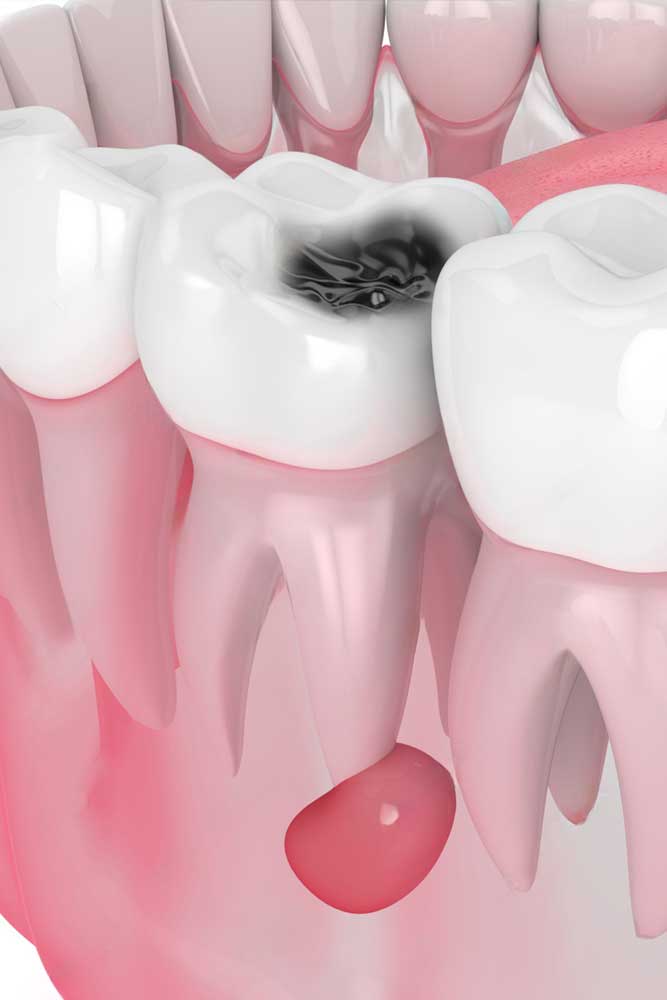Root Canal Therapy
Preserve your tooth with precise root canal care.
Root canal therapy at our Jackson Square Mall dentist office is designed to alleviate pain, eliminate infection and save your natural tooth.


Relieve pain.
Avoid extractions.
What is a root canal?
A root canal treats infection in the centre of the tooth when the pulp (the soft area within a tooth that contains nerves, blood vessels and connective tissue) becomes infected or inflamed. A root canal can remove the infection, relieve pain and restore normal function to the tooth (as opposed to having it extracted).
When is a root canal required?
Root canal procedures are often necessary for the following situations:
Deep decay (infection inside a tooth)
After repeated dental procedures that have inflamed the pulp
When a cracked or chipped tooth has led to an internal infection
Dental trauma which has damaged the pulp
Large fillings that have impinged on the tooth pulp
Unexplained pain or swelling due to pulp inflammation
Your dentist will determine whether dental crowns are the best restoration option for your situation or if procedures such as dental veneers or dental implants would provide a better treatment outcome.
Signs you might need a root canal
Recognizing the signs that you might need a root canal is key to addressing potential dental issues before they become more severe.
Signs a root canal could be necessary?

Severe toothache
Prolonged tooth sensitivity
Tooth discolouration
Swollen or tender gums
Gum abscess
Painful or swollen lymph nodes
Tooth trauma (cracks, chips)
Spontaneous pain
If you’re experiencing any of these symptoms, it’s essential to consult with a dentist as soon as possible to diagnose the issue and determine if a root canal is necessary. Early intervention is key to preserving the tooth and preventing further complications.
Steps of a root canal procedure
he tooth is isolated with a rubber dam (a sheet of rubber) to keep it clean and dry during the procedure.
Once your new teeth are ready and perfect, your dentist will attach them to your teeth, and that’s it; your new smile is ready to shine!
Using special instruments, the infected or damaged pulp is removed from the pulp chamber and root canals. This includes the nerve tissue, which is why the tooth won’t feel pain after a root canal.
The canals are then cleaned and shaped with a series of small files to remove all traces of infection and to prepare them for the filling material. This step may involve the use of irrigation solutions and medication to treat and disinfect the canals.
Once the canals are cleaned and dried, they are filled with a biocompatible material, usually a rubber-like material called gutta-percha. The filling material is placed with an adhesive cement to ensure complete sealing of the canals.
The opening in the tooth is then sealed with a temporary or permanent filling to prevent bacteria from entering.
After the root canal, the tooth may need a crown or other restoration to protect it, restore it to full function, and improve its appearance. This is often done in a separate appointment.
We are the experts for root canals in Hamilton.
Expertise
Experience
Precision
Our dentists and endodontists are experts in root canal procedures. We specialize in restoring teeth that might otherwise need to be extracted due to abscesses and other inner tooth infections.
Knowing how to approach each root canal procedure can only be learned from experience. We’ve completed thousands of tooth canals and know how to make the procedure process successful.
Our endodontists deliver successful root canals by employing the high degree of precision and care that is required when working with small spaces and delicate inner tooth tissue.
Root canal treatment FAQ
Risks are rare, including infection, tooth fracture, or missed canal branches during cleaning.
Modern techniques and anesthetics make root canals no more uncomfortable than a filling. Some discomfort post-procedure is normal but manageable.
It typically takes one to two visits, each lasting about 90 minutes, though it can vary depending on the complexity of the tooth and the extent of infection.
The main alternative is extraction, but this usually requires a bridge or implant to replace the missing tooth, which can be more costly and complex.
Both ceramic and porcelain offer the best colour matching of any crown type and a natural translucency that helps ensure a seamless appearance. These materials are strong, durable, and more than capable of withstanding the forces exerted through biting and chewing. They are also less abrasive than metal crowns (good news for adjacent teeth) and are biocompatible, meaning they are least likely to cause an allergic reaction.
Often, a crown is recommended to protect the tooth, restore its function, and improve aesthetics, especially for back teeth.
Yes, the tooth is still susceptible to decay and gum disease, so good oral hygiene is essential.
Root canal treatments have a high success rate, typically over 95%.
Costs vary depending on the tooth and complexity. Many dental insurance plans partially cover root canal treatment.
Yes, some discomfort or mild pain post-procedure is normal and usually subsides within a few days.
Signs of infection include severe pain, swelling, a return of the original symptoms, or a visible pimple on the gums. Contact your dentist if you experience these symptoms.
Ready to restore
your smile?
Book your free consultation at our
Jackson Square Mall location now.
Root Canal Treatment
Preserve your tooth with precise root canal care.
Root canal therapy at our Jackson Square Mall dentist office is designed to alleviate pain, eliminate infection and save your natural tooth.
Relieve pain.
Avoid extractions.


What is a root canal?
A root canal treats infection in the centre of the tooth when the pulp (the soft area within a tooth that contains nerves, blood vessels and connective tissue) becomes infected or inflamed. A root canal can remove the infection, relieve pain and restore normal function to the tooth (as opposed to having it extracted).
When is a root canal required?
Root canal procedures are often necessary for the following situations:
Deep decay (infection inside a tooth)
After repeated dental procedures that have inflamed the pulp
When a cracked or chipped tooth has led to an internal infection
Dental trauma which has damaged the pulp
Large fillings that have impinged on the tooth pulp
Unexplained pain or swelling due to pulp inflammation
Your dentist will determine whether dental crowns are the best restoration option for your situation or if procedures such as dental veneers or dental implants would provide a better treatment outcome.
Signs you might need a root canal
Recognizing the signs that you might need a root canal is key to addressing potential dental issues before they become more severe.
Signs a root canal could be necessary?
Severe toothache
Prolonged tooth sensitivity
Tooth discolouration
Swollen or tender gums
Gum abscess
Painful or swollen lymph nodes
Tooth trauma (cracks, chips)
Spontaneous pain
If you’re experiencing any of these symptoms, it’s essential to consult with a dentist as soon as possible to diagnose the issue and determine if a root canal is necessary. Early intervention is key to preserving the tooth and preventing further complications.
Steps of a root canal procedure
our dentist or endodontist (a specialist in root canal treatments) begins with an examination, which may include taking X-rays to assess the extent of the tooth decay or damage and to visualize the shape of the root canals.
To ensure the patient is comfortable during the procedure, local anesthesia is administered to numb the tooth and surrounding area.
he tooth is isolated with a rubber dam (a sheet of rubber) to keep it clean and dry during the procedure.
Once your new teeth are ready and perfect, your dentist will attach them to your teeth, and that’s it; your new smile is ready to shine!
Using special instruments, the infected or damaged pulp is removed from the pulp chamber and root canals. This includes the nerve tissue, which is why the tooth won’t feel pain after a root canal.
The canals are then cleaned and shaped with a series of small files to remove all traces of infection and to prepare them for the filling material. This step may involve the use of irrigation solutions and medication to treat and disinfect the canals.
Once the canals are cleaned and dried, they are filled with a biocompatible material, usually a rubber-like material called gutta-percha. The filling material is placed with an adhesive cement to ensure complete sealing of the canals.
The opening in the tooth is then sealed with a temporary or permanent filling to prevent bacteria from entering.
After the root canal, the tooth may need a crown or other restoration to protect it, restore it to full function, and improve its appearance. This is often done in a separate appointment.
We are the experts for root canals in Hamilton.
Expertise
Our dentists and endodontists are experts in root canal procedures. We specialize in restoring teeth that might otherwise need to be extracted due to abscesses and other inner tooth infections.
Experience
Knowing how to approach each root canal procedure can only be learned from experience. We’ve completed thousands of tooth canals and know how to make the procedure process successful.
Precision
Our endodontists deliver successful root canals by employing the high degree of precision and care that is required when working with small spaces and delicate inner tooth tissue.
Root canal treatment FAQ
Risks are rare, including infection, tooth fracture, or missed canal branches during cleaning.
Modern techniques and anesthetics make root canals no more uncomfortable than a filling. Some discomfort post-procedure is normal but manageable.
It typically takes one to two visits, each lasting about 90 minutes, though it can vary depending on the complexity of the tooth and the extent of infection.
The main alternative is extraction, but this usually requires a bridge or implant to replace the missing tooth, which can be more costly and complex.
Both ceramic and porcelain offer the best colour matching of any crown type and a natural translucency that helps ensure a seamless appearance. These materials are strong, durable, and more than capable of withstanding the forces exerted through biting and chewing. They are also less abrasive than metal crowns (good news for adjacent teeth) and are biocompatible, meaning they are least likely to cause an allergic reaction.
Often, a crown is recommended to protect the tooth, restore its function, and improve aesthetics, especially for back teeth.
Yes, the tooth is still susceptible to decay and gum disease, so good oral hygiene is essential.
Root canal treatments have a high success rate, typically over 95%.
Costs vary depending on the tooth and complexity. Many dental insurance plans partially cover root canal treatment.
Yes, some discomfort or mild pain post-procedure is normal and usually subsides within a few days.
Signs of infection include severe pain, swelling, a return of the original symptoms, or a visible pimple on the gums. Contact your dentist if you experience these symptoms.
Ready to restore
your smile?
Book your free consultation at our
Jackson Square Mall location now.


